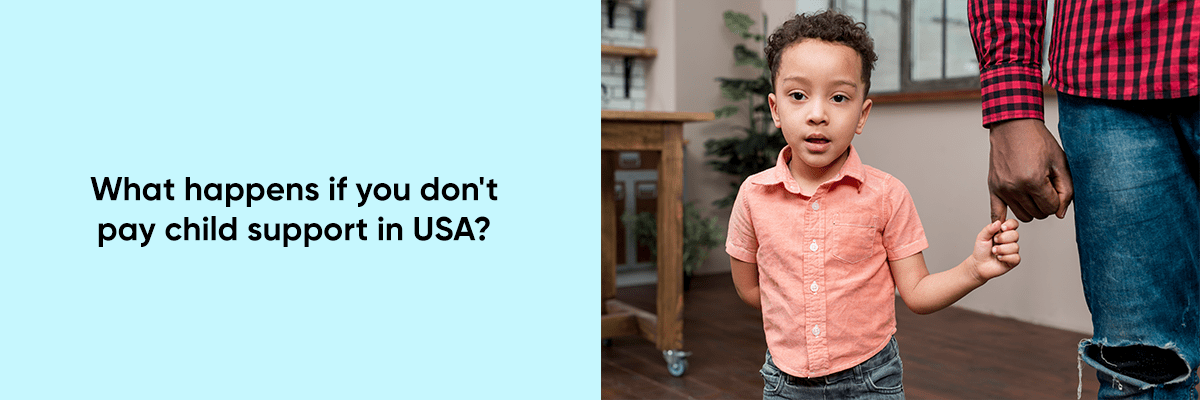In the United States, failure to pay child support can lead to a variety of legal and financial consequences. Child support is a court-ordered payment made by one parent to another to help cover the costs of raising a child, and states take non-payment very seriously.
Here are the potential outcomes and penalties if you don’t pay child support:



1. Wage Garnishment
One of the most common enforcement methods is wage garnishment. This means the non-paying parent’s employer is legally required to withhold a portion of their income and send it directly to the appropriate child support agency. Wage garnishment can continue until all back child support (arrears) is paid off.
Employers are legally required to comply with child support withholding orders, ignoring these orders can lead to significant legal and financial consequences for employers.
2. Tax Refund Interception
The government may intercept the non-paying parent’s federal or state tax refunds to cover unpaid child support. This process, known as the Federal Tax Refund Offset Program, applies even if the parent files jointly with a spouse.
3. Seizure of Assets
Bank accounts, investment accounts, and other financial assets can be seized to collect unpaid child support. In some cases, liens may also be placed on property, including homes or vehicles, to enforce payment.
4. License Suspension
Non-payment of child support can result in the suspension of various licenses, including:
- Driver’s licenses
- Professional licenses (for doctors, lawyers, contractors, etc.)
- Recreational licenses (hunting, fishing, etc.)
This is a state-level enforcement tool, and the specific rules may vary by state.
5. Denial of Passport
Under the Passport Denial Program, parents who owe more than $2,500 in back child support can have their application for a U.S. passport denied or their existing passport revoked. This can prevent international travel until the outstanding debt is resolved.
6. Credit Reporting
Failure to pay child support can negatively impact credit scores. Child support arrears are reported to credit bureaus, and the unpaid amount appears on the non-paying parent’s credit report. This can make it more difficult to get loans, credit cards, or even housing.
7. Civil and Criminal Contempt of Court
A parent who fails to comply with a court order to pay child support may be held in civil or criminal contempt of court. This could lead to:
- Fines
- Incarceration: Courts may order jail time for contempt of court, although jail is typically used as a last resort after other enforcement methods have failed.
Courts usually allow parents to “purge” the contempt by paying a portion of the owed support or by establishing a payment plan.
8. Jail Time
If a parent consistently fails to pay child support and does not comply with court orders, they may be sent to jail. While jail time is not common for first-time offenders, repeat non-payers may face incarceration. Jail sentences typically don’t erase the obligation to pay child support, and the arrears continue to accumulate during incarceration.
9. Interest on Arrears
In many states, unpaid child support accrues interest, making the amount owed even larger over time. Interest rates vary by state but can be significant, adding further financial pressure on the non-paying parent.
10. Loss of Government Benefits
In some cases, states can garnish certain government benefits, such as unemployment insurance or workers’ compensation, to collect unpaid child support.
11. Interstate Enforcement
Child support orders are enforceable across state lines, thanks to the Uniform Interstate Family Support Act (UIFSA). This means if a parent moves to a different state to avoid paying child support, the state they moved to can still enforce the original order.
12. Civil Lawsuits
In some cases, a parent owed child support may sue the non-paying parent in civil court for unpaid amounts. This is less common, as most states have strong enforcement mechanisms already in place.
How to Avoid These Penalties
If a parent is unable to pay child support due to financial difficulties, they should immediately notify the court and file for a modification of the child support order. Courts may lower the payments if there is a valid reason, such as job loss, illness, or other financial setbacks. Ignoring the issue will lead to penalties, so it’s essential to act proactively.
For employers the correct recording of child support deductions in payroll is of utmost importance, as it impacts them, their employees, and the well-being of the children involved. So it is crucial to learn the correct method to record child support deductions.
Conclusion
Failing to pay child support in the U.S. carries severe consequences, including wage garnishment, and even jail time in remote cases. Parents who face difficulty paying child support should seek legal advice and consider requesting a modification from the court rather than letting the arrears accumulate. It is always better to communicate with the court and the child support agency to explore possible solutions.


